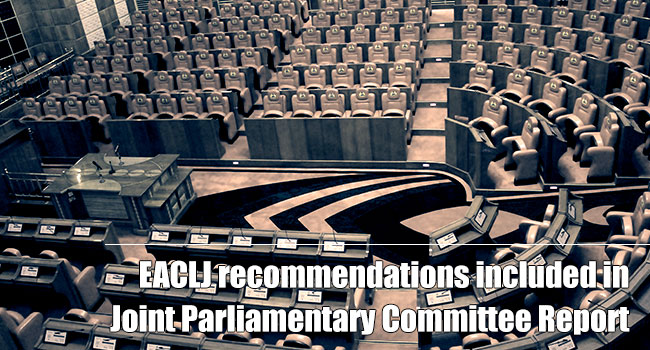EACLJ Recommendations Included In Joint Parliamentary Report On The IEBC

In the mid-morning hours of 27th July, 2016 Murimi Karani of the East Africa Center for Law and justice made a presentation to the Joint Parliamentary Select Committee mandated to deal with matters relating to the Independent Electoral and Boundaries Commission. The presentation was based on the two distinct memoranda prepared by EACLJ providing recommendations on legal, policy and institutional reforms to strengthen the Independent Electoral and Boundaries Commission in a bid to ensure the August, 2017 elections are free and fair and are administered in an impartial, efficient, simple, accurate, verifiable, secure, accountable and transparent manner.
About three weeks later and the committee has finalized its report in consideration of the views aired by various groups and individuals before it. We are happy to report that some of our key proponents have been included in the report; they include
- The recommendation that only party members should be allowed to vote in the party nominations: For a long time now, parties have been conducting their nomination elections at the polling station using the voter register provided by the electoral body. This has not only been linked to malpractice (especially in places where certain parties are dominantly popular) but there have emerged allegations of manipulation by the other parties to influence their opponent's candidate. The situation informed the EACLJ's call to have the nominations to be based on party members only. The Joint Committee co-chaired by Senators James Orengo and Kiraitu Murungi has echoed these sentiments by making recommendations that the party nomination should be based on the party list and that only the registered party members can participate in the nominations.
- A recommendation that the party list for special seats should be submitted at the same time the party is publishing nominated candidates for the elective seats: The political field in Kenya has for a long time been played as a rewarding scheme. More so, the allocation of special seats has become an opportunity for election losers to find their way back to leadership positions. The EACLJ made the observation that the practice has not fared well with the people's right to be represented and as a result suggested to the committee that the lists by parties on allocation of special seats be submitted at the same time as the publication of nominated candidates for elective seats. The policy which is geared towards ensuring transparency and limiting the political squabbles occasioned at the nomination stage has been endorsed by the joint parliamentary committee in their report on thematic area 4.
- Embracing technology in the registration of voters: The EACLJ made submissions highlighting the need for technology in the registration of voters. We were keen to point out the efficiency of existing public portals such as itax used for filing tax returns and e-citizen which is now used for visa application, car search, business registration among others. The committee seemingly heeded to our request and has included a recommendation that the IEBC makes provision for online inspection of the Principal Register of Voters by individual voters through a public portal.
- Appointment of the president's four nominees by the Parliamentary Service Commission: As observed from the opposition's push for the disbandment and the call for dialogues to appoint new commissioners, it was clear that the political issue on appointment of members of IEBC stemmed out of the fact that the President has to nominate four people to the selection panel. It was for this reason that we urged the committee to consider subjecting the four nominees to an open, transparent and competitive process. At one point through EACLJ's presentation, Hon (amb) Mohammed Mahmoud, member for Mandera West, inquired from us which institutions would be best suited to handle the process. The committee has made a recommendation in their report suggesting that four members of the selection panel (two men and two women) be nominated by the parliamentary service commission.
- Staggered appointment of the commissioners: Regardless of the fate of the current IEBC commissioners, EACLJ observed that the terms of office need to be varied in order to create continuity and avoid a situation where the commission is left vacant. To this end, we proposed that the selection panel appoints two commissioners every three years after nominating the first team of three commissioners. The result would have commissioners' term expiring at different times to minimize the risk of infringing with elections. The stand has been espoused in the report by the joint committee which recommends that mechanisms be put in place to provide for staggered appointment of the commissioners.
- Integration of information and citizens' data from all other state agencies and institutions: EACLJ's memorandum on thematic area four put forth a recommendation that the IEBC should incorporate data from other state agencies in a push to have the voter cards substituted by the national Identification Cards. Our submissions focused on the alleged voter apathy reported by the IEBC in which we pointed out that citizens should be enabled to register as voters at the same time they are applying for national Identity cards. After deliberations on the review of the principal voter register, the commissioners settled on a number of recommendations which included one that for purposes of the conduct of the audit and in the future for the maintenance of the principal voters' register, the National Registration Bureau and all other agencies and institutions that hold information on Kenyan citizens avail the information to the Independent Electoral and Boundaries Commission electronically for cross-referencing.
- The stand on party hopping: One of the main proponents of EACLJ's recommendation to have party lists for special seats submitted at the same time as the publications of the nominated candidates was discouraging party hopping. At the presentation, Senator Beatrice Elachi was keen to inquire our stand on party hopping to which we replied with conviction that the people of Kenya should not be subjected to ambiguous measures at the expense of election leaders seeking to bypass their way to leadership position. The committee has since made a recommendation that after the names of candidates are forwarded to the IEBC, candidates cannot change their parties.
- Vacation from office by the commissioners other than by way of removal: One of the key observations of the EACLJ in response to the mandate of the joint parliamentary select committee was the fact that the constitution does not provide for any other means other than removal from office of a commissioner under article 257. This basically meant that the process for disbanding the IEBC entailed filing a petition to the national assembly laying allegations of serious violations of the constitution or any other law, gross misconduct, incapacity, incompetence and/or bankruptcy. Parliament should then consider the petition and, if satisfied that it discloses a ground, forward the same to the president who may suspend the officer and appoint a tribunal to investigate the matter. The makers of the provisions failed to predict a situation where the members could be relieved off their duty in any other way and thus the committee has included a recommendation that the Elections Act be amended to include provisions on vacation of office by the commissioners other than by way of removal.
- Inclusion of non-state actors in voter education: EACLJ made an observation of the existing systems of voter education such as K-NICE (Kenya National Integrated Civic Education) and called for the involvement of non-state actors such as the civil society in voter education. The function has been left primarily to the IEBC forming the basis on which the committee has made a resolve that it partners with other agencies and non-state actors.





